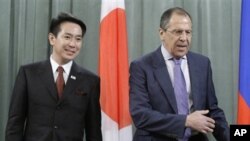Japan and Russia’s top diplomats traded undiplomatic language Friday over a 65-year-old standoff over disputed Islands. Analysts said the election calendar might be dictating Russia’s tough talk.
Russian Foreign Minister Sergei Lavrov called Japan’s position radical, adding that dialogue has "no chance."
Seated next to the Russian diplomat at a press conference in Moscow Friday, Japanese Foreign Minister Seiji Maehara responded icily: "The Northern Territories are age-old Japanese territory."
What's involved
The dispute revolves around Pacific islands that the Soviet Union seized in the final days of World War II. Russia calls them the Southern Kuriles. Japan calls them the Northern Territories.
The dispute has dragged on since 1945. Suddenly, it has flared anew. Some commentators say it has do with the fact that Russia is now in an election year. Parliamentary elections are in December. Presidential elections are one year from now. Asia analyst Bobo Lo says President Medvedev wants to show himself tough, like Prime Minister Putin.
"There is a contrast between tough Putin, and soft, sensitive Medvedev," said Lo. "What Medvedev may want to do, and what the people around Medvedev may want to do, is to steel up his image a little bit."
Russian visit
Last fall, Dmitry Medvedev became the first Russian President to visit the island group, home to 19,000 Russians who live largely off fishing. Last week, his defense minister visited the largest island.
This week, Japan’s prime minister Naoto Kan called the Russian visits an unforgivable outrage. Japanese rightists protested in Tokyo, trampling a Russian flag and mailing a bullet to the Russian Embassy.
In response, President Medvedev went on national television and gave stern instructions to defense officials to bolster military installations on the island.
Fight heats up
Since then, Russian military officials have given interviews, outlining plans to send helicopters, helicopter carrying warships, and armored personnel carriers to the fog bound islands. One Russian general talked of plans to extend the runway on the biggest four islands to allow the landing of massive military transport planes.
On Friday, while the foreign ministers were meeting here, the Japanese embassy in Moscow was picketed by a rotating series of pro-Kremlin youth groups - Young Russia, Young Guard, and Steel. At one rally, protesters chanted "We won't give up the Kurils!" and pretended to flog an activist dressed as Japan’s prime minister.
At the press conference the Russian foreign minister made a point of saying that Russia would welcome investment on the Kuriles from Japan’s historic enemies in Asia - China and Korea. Alexander Lukin director of a Foreign Ministry affiliated East Asia study center, asked: "Who cares?"
"Nobody told the Japanese that Russia was not going to develop these islands, to not have its military on these islands," said Lukin. "So if they want to see it as a slap in the face, who cares?"
Lukin said that while political relations between Japan and Russia may be hitting new lows, economic relations are hitting new highs. He said that Japan rivals China as the leading Asian investor in Russia. Japanese investors come here, he said, because they can make money.
Business as usual
Indeed, on Wednesday, Tokyo newspapers reported that Toyota is planning to open a car assembly plant in Vladivostok capable of producing 30,000 Toyotas a year. On Thursday, Carlos Ghosn, head of Renault-Nissan, announced plans for this French-Japanese alliance to take majority control this year of Avtovaz, Russia’s largest car manufacturer.
Indeed, politics do not seem to be disrupting ties. On Friday, one Russian nationalist party, the Liberal Democrats, picketed the Japanese consulate in Vladivostok. They carried signs reading, "Stop Dreaming of the Kurils."
Hoping to inspire voters, the party is calling for a nationwide strike of the hundreds of sushi restaurants that dot Russian cities. Judging by the crowds Friday in Moscow’s sushi restaurants, not too many Russians plan to give up their tuna rolls to make a political point.
Russia, Japan Trade Insults Over Islands
- By James Brooke




